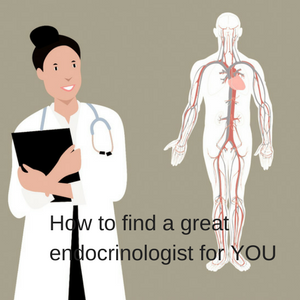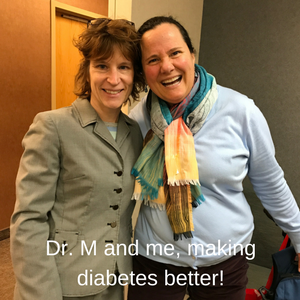 As you likely know, I have type 1 diabetes. I’ve had it for almost 37 years. That means that I’ve had to go to visit a medical doctor A LOT. On average, I go 4 times a year. Once a quarter. For most of the years I’ve had diabetes, I go see a specialist. I go see an endocrinologist, which is a medical doctor who specializes in the endocrine system, the system that controls the hormones in the body. Insulin is a hormone, and when you have type 1 diabetes, the body doesn’t make insulin. In my case, I make practically zero insulin. I’ve been tested, that’s how I know that.
As you likely know, I have type 1 diabetes. I’ve had it for almost 37 years. That means that I’ve had to go to visit a medical doctor A LOT. On average, I go 4 times a year. Once a quarter. For most of the years I’ve had diabetes, I go see a specialist. I go see an endocrinologist, which is a medical doctor who specializes in the endocrine system, the system that controls the hormones in the body. Insulin is a hormone, and when you have type 1 diabetes, the body doesn’t make insulin. In my case, I make practically zero insulin. I’ve been tested, that’s how I know that.
In addition to diabetes, endocrinologists see people who have (it’s a long list!) adrenal disorders, osteoporosis and bone health issues, endocrine disorders in children (growth issues), heart problems related to high cholesterol, triglycerides, and high blood pressure; men’s health related to infertility and testosterone levels; women’s health related to menopause, infertility and menstruation; pituitary disorders, thyroid disorders and weight and metabolism issues. Whew, that’s a BIG list.
So, maybe you’re wondering, how do you find a great endocrinologist? Because I’ve had diabetes so long and I’ve primarily gone to get support from endocrinologists, and I’ve lived in a bunch of different cities over the years, I’ve had lots of opportunity to find great endocrinologists. I like to be of service, so here are my hints for finding your great endocrinologist.
You are the CEO of You
The first thing I do is remind myself that I am the CEO of Mari Ruddy, which includes the body of Mari Ruddy. And anyone who is going to be my medical doctor needs to be a member of my team. That means, I hire them and I have the power to fire them, if needed. Best bet is to do a good job in the hiring process.
This is true for you. You are the CEO of you and your body. By taking yourself seriously, you too deserve to hire someone that you enjoy having on your team.
Hire your medical team
Like any good hiring process, it’s best to know exactly what you’re looking for. What qualities matter to you? What do you want from your endocrinologist? Figuring this out takes a bit of time, time well spent.
What matters most, hire that
 In my case, I want my endocrinologist to be an endurance athlete. I want them to live the practices they want me to practice. Meaning, they care about their own physical health and well-being. Being a person in alignment matters to me. It matters less to me that my endocrinologist be able to quote medical data and studies. There are some endos who can do that. I’ve met them. It’s a cool ability, but it’s a skill that’s low on my chart of what matters most to me.
In my case, I want my endocrinologist to be an endurance athlete. I want them to live the practices they want me to practice. Meaning, they care about their own physical health and well-being. Being a person in alignment matters to me. It matters less to me that my endocrinologist be able to quote medical data and studies. There are some endos who can do that. I’ve met them. It’s a cool ability, but it’s a skill that’s low on my chart of what matters most to me.
My current endocrinologist is Rebecca Mattison, MD of The Endocrinology Clinic of Minneapolis and she is a serious soccer player and for a number of years, she sponsored a team of women who collectively did the Women’s YWCA of Minneapolis Triathlon every year. Dr. Mattison was herself a member of the team! Every year, she invited the team over to her house for a team kick-off. That is a person who walks her talk.
A few more tips for how to find that great endocrinologist to be on your medical team:
- Ask for recommendations from your (Facebook) friends/and if you have diabetes, inquire of the Diabetes Online Community (DOC)
- Interview a few possibilities, and as I mentioned above, know what you are interviewing to find
- Take a moment and verify that your insurance will cover this doctor
- Keeping in mind that reviews are relative, look up reviews of potential endocrinologists on HealthGrades.com or other doctor review sites
- If you value alternative medicine, make sure the endocrinologist will support that
This is super important to me, as I get regular acupuncture and for my insurance to cover it, I have my endocrinologist write an order to go to acupuncture.
6. Make sure you can effectively communicate with your endocrinologist.
This is a really critical part of the selection process, in my opinion. I actually look forward to going to my four times a year appointments with Dr. Mattison. She’s fun, smart, thoughtful, kind and very insightful. I feel like she gets how difficult it is to live well with diabetes. Talking with her is productive and it moves me forward in excellent care of living well with diabetes.
Please let me know in the comments how you found your great endocrinologist! I’d love to hear how you did it!!
And if you’re still searching, I wish you the very best in your search to find a great endocrinologist!
Keep me posted on how it goes!
I live in a rural area. Our nearest Endo clinic is 35 miles away. In 2015, I was having issues with my blood sugar even though I was taking Lantus, meformin, and actos. In addition, I was in full nutritional ketosis and training for 1/2 marathons. I had had enough, and started looking for endos, as my GP had been my only doctor to this point. Most would not even talk to me without me sending them all of my medical records and scheduling an official appointment. One who did was Richard K Bernstein, author of The Diabetes Solution. He answered the phone the day I called, and talked to me for a good 15 minutes. I decided not to go to his clinic, but instead called the East Carolina University Endo Clinic. I explained what was happening to the receptionist, and she said “Honey, sometimes our bodies just don’t do what we need them to do.” She said the head of diabetes research would likely take me as a patient, with the understanding that I would spend most of my appointment with an Endo Fellow (MD who is training to be an Endo). At my first appointment, Dr. Tannenberg looked at my BGs, my race training plan, and my food intake for the past 30 days. He said “No way you are a Type 2.” He sent me for the GAD antibody test. It confirmed I had LADA. He put me on Januvia, which worked for a while. After running a PR 1/2 marathon that fall, I began training for a marathon. My BGs were good, and I was maintaining nutritional ketosis. In the spring, right before my marathon, I hurt my hamstring and could not run or bike for a good month. My BGs skyrocketed. I went back to Dr. T and he said it was time for bolus insulin. About a year later, I got a CGM, which helped tremendously, mostly by keeping me from cheating. Last December, I got the Ominpod insulin pump. It is convenient, and I only have to stick myself 1 time every 3 days instead of 4+ times per day. Last 3 A1cs have been 5.8, 5.8, and 6.1. Going to a university clinic does have some drawbacks. First, you do spend most of your time with a trainee. My typical appointment is 45 minutes long, mostly discussion. I only see the actual endo for about 10 minutes, and there are several that rotate around. Getting a summer appointment is difficult since that is when the previous fellows leave and the new ones arrive. Sometimes they don’t overlap. I too would like to have a doctor who was an athlete and a T1 diabetic. However, as a scientist, I am interested in current research and developments and want someone who keeps up with it. In my profession, I am more inclined to work with those who are actively engaged and have at least a basic understanding of the subject. The doctors, fellows, and nutritionists at the university like to work with me because I take charge of my disease and try to keep up with current developments. As one said to me “You are not like 99% of our patients.” I understand that my new fellow this fall is big into nutrition and athletics. I am looking forward to that.
Cabe,
WOW!! What an amazing story! Thank you for sharing!!! Good job sticking with it and for finding people (medical people) to support you! You’ve inspired me!! Well done!
Mari